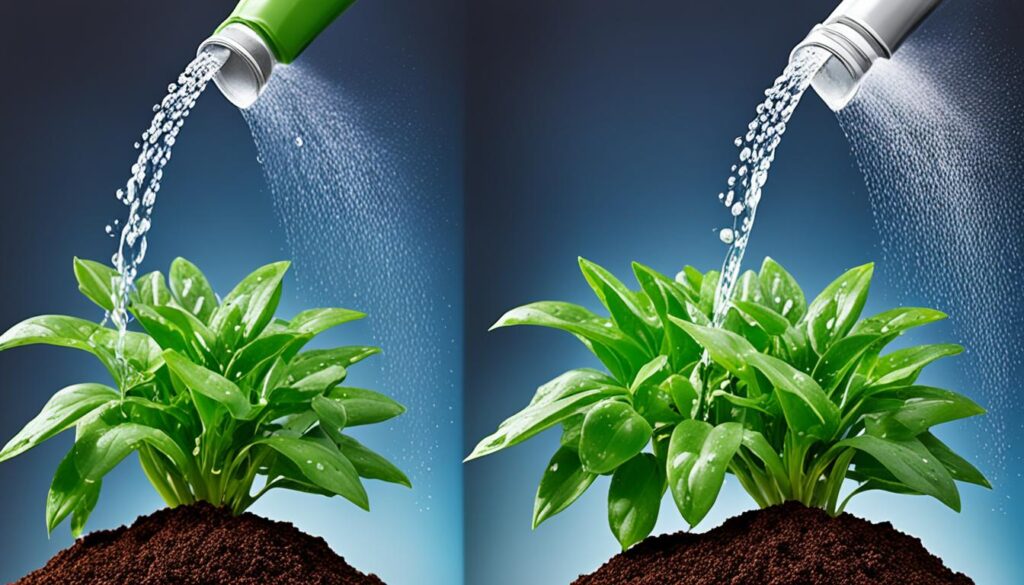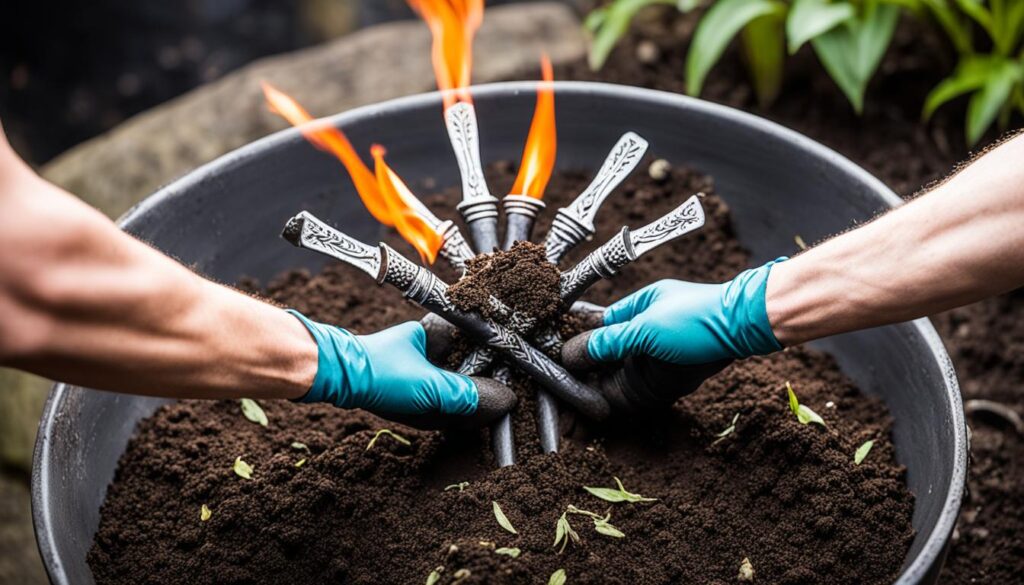Did you know the Flaming Sword, or Vriesea, is super cool? It’s not just pretty. It also cleans the air in your place. This plant adds beauty and helps you breathe better. In this guide, you’ll learn how to take care of it. I’ll tell you the best pot, soil, light, and humidity for it. Whether new or skilled at growing plants, you’ll learn how to keep this one happy.
Key Takeaways:
- Flaming Sword is both a visually stunning and air-purifying houseplant.
- This complete guide will cover everything you need to know about growing and caring for the Flaming Sword in your apartment.
- Learn helpful tips and techniques to ensure your Flaming Sword thrives and adds vibrancy to your indoor space.
- Discover the ideal potting, lighting, watering, and fertilizing techniques for optimal growth.
- Get insights on pruning, propagation, and how to deal with pests and diseases to keep your Flaming Sword healthy and beautiful.
Why Do We Love the Flaming Sword For Apartments?
The Flaming Sword is great for apartments because it’s pretty and easy to care for. It has bright colors and looks like it comes from the tropics. This makes any room look fun and full of life.

Is the Flaming Sword Air-Purifying?
Yes, the Flaming Sword cleans the air which is a big plus for your place. It takes out bad stuff from the air. This makes the air better to breathe for you and your family.
Is the Flaming Sword Pet Friendly?
People with pets will like that the Flaming Sword is safe for them. It’s not harmful to cats and dogs. This means you don’t have to worry about your pet’s health around it.
How Big Does the Flaming Sword Get?
The Flaming Sword can get pretty big, but don’t let that stop you. You can trim it to keep it the size you like. That way, it stays perfect without losing its pretty look.
How to Grow a Flaming Sword – Learn to Grow this Indoor Beauty
Growing a Flaming Sword needs you to pay attention to certain things. We’ll go over how to take care of it. You’ll learn how to pick the right pot and soil. These are important for the plant to grow well.
Getting the light right is very important for the Flaming Sword. You will find out the best light for this plant. Keeping the right amount of water and humidity is key. We will share tips to keep the moisture just right.
Nutrition and fertilization help the plant grow strong. You will learn which fertilizers work best for the Flaming Sword. Pruning keeps your plant looking great. If you want to make more Flaming Swords, we’ll show you how.
Lastly, you’ll learn to watch out for pests and diseases. And we will tell you what to do if they appear.

Appearance of Flaming Sword
The Flaming Sword is a beautiful plant that catches everyone’s eye. It has tall, sword-like leaves in bright colors like orange, red, pink, and yellow.
The leaves grow in a circle, making the plant look neat and pretty. This plant can get very tall, making a big statement in any room. It brings a bit of the tropics into your home.

Light Requirements for Flaming Sword
The Flaming Sword needs good light to grow well. It loves bright, indirect light just like its home in the wild. But keep it away from direct sun because that can hurt it. It’s best near a window that faces north or east. There, it gets lots of light without any harm.
If your place is a bit dark, use artificial grow lights. These lights are like the sun for your plant. They help the Flaming Sword grow strong. Just make sure you check how much light it gets. Move it around if you need to, so it gets just the right amount.

Watering Requirements of The Flaming Sword
Watering the Flaming Sword right helps it grow strong and healthy. It’s key to keep the soil’s moisture just right.
Make sure the soil is moist but not too wet. Too much water can cause root rot. Watering depends on temperature, humidity, and the soil type.
Check the soil to see if your plant needs water. Stick your finger in the soil. If it’s dry, it’s time to water. If it’s moist, wait before watering.
Signs of Overwatering vs. Underwatering
Knowing if you’re overwatering or underwatering is important. This helps you care for the Flaming Sword better.
Signs of overwatering include:
- Yellowing and wilting leaves
- Soggy or waterlogged soil
- Foul smell coming from the soil
Signs of not watering enough include:
- Leaves droop and dry
- Soil cracks or dries out
- Plant growth is weak or stunted
Watch your plant’s water needs closely to keep it healthy. Each Flaming Sword is different and may need time to figure out the best watering plan.
Here’s a quick guide on watering the Flaming Sword:
| Watering Requirements for the Flaming Sword |
|---|
| Keep the soil evenly moist. |
| Avoid waterlogging the soil to prevent root rot. |
| Check the moisture levels of the soil regularly. |
| Overwatering signs: yellowing and wilting leaves, soggy soil, foul smell. |
| Underwatering signs: drooping and dry leaves, cracked soil, weak growth. |
Good watering habits are key to your Flaming Sword’s health. Knowing when to water and spotting problems helps your plant thrive.

Fertilizing Flaming Swords
Fertilizing is key for Flaming Swords to grow healthy and look bright. With the right nutrients, your plants will thrive and look amazing.
Recommended Fertilizer for Flaming Swords
Use a balanced, water-soluble fertilizer for Flaming Swords. Apply it once each month in spring and summer.
You can pick a general houseplant fertilizer or one for bromeliads. Find a fertilizer with nitrogen, phosphorus, and potassium.
Be sure to follow the instructions on the fertilizer package. Too much fertilizer can damage your plants. So, don’t use more than what’s recommended.

| Fertilizer Type | Application Frequency | Application Period | Recommended Dosage |
|---|---|---|---|
| General-purpose houseplant fertilizer | Once a month | Spring to summer (growing season) | Follow package instructions |
| Bromeliad-specific fertilizer | Once a month | Spring to summer (growing season) | Follow package instructions |
In winter, Flaming Swords sleep and don’t need food. Give them the right light, water, and warmth instead.
Potting Flaming Swords
Choosing the Right Pot Size
When potting a Flaming Sword, pick the right sized pot. It should be a bit larger than the plant’s root ball. This gives roots room to grow.
A too-big pot can trap too much water. This may cause the roots to rot. Use pots with holes at the bottom.
Using the Right Potting Mix for Flaming Swords
The potting mix is key for Flaming Swords to thrive. Choose one that drains well. It should have peat moss or coconut coir and perlite or vermiculite.
This mix makes sure the plant’s roots get enough air and don’t sit in water. Don’t use soil that is heavy and doesn’t drain well. It makes it hard for the roots to grow.
Repotting When Necessary
Flaming Swords need new pots when they get too big. You might see roots through the holes or the plant could look unstable. Then, it’s time to repot.
Gently move the plant to a new pot with fresh soil. The new pot should be a little bigger. Repot in the warm, growing months.

Propagating Flaming Swords
Propagating the Flaming Sword lets you grow your plant collection. You can use stem cuttings or division to do this.
Stem Cuttings Or Seeds?
Stem cuttings are an easy way to grow Flaming Swords. First, pick a healthy leaf and remove it. Put the cutting in a well-draining potting mix. Keep it moist and in indirect light. Soon, it will grow roots.
But, growing Flaming Swords from seeds is harder. You need to get seeds from a mature plant. Plant the seeds in a good potting mix. They need warmth and humidity to grow. It might take a few weeks or months for seeds to sprout.
Division Of A Flaming Sword
You can also grow Flaming Swords by dividing them. Look for “pups” at the base of mature plants. You can separate these pups and plant them on their own. Make sure each pup has roots and leaves.
With care, propagating Flaming Swords can be very rewarding. You can make new plants by using cuttings or by dividing them.

Growth and Development of Flaming Swords
Learning about Flaming Swords helps me meet their needs. It grows slow and steady. Leaves pop up from the middle of the plant. As it gets older, it makes “pups” near the bottom. We can grow these into new plants. The right light, water, and food make it healthy and colorful. With good care, it will look amazing.
Flaming Swords grow slow. Each new leaf makes it more beautiful. Watching how it grows helps us care for it better.
Your Flaming Sword starts small. Then, new leaves come from the center, making it bigger and prettier.
Your plant also makes “pups” at the bottom. You can grow these into new Flaming Swords. It’s fun to make more plants for friends or your home.
Good care makes your Flaming Sword grow well. It needs enough light and water. It also needs the right food. All this helps your plant be its best.

Dealing with Pests and Diseases in Flaming Swords
The Flaming Sword plant is tough but sometimes gets bugs or sick. Mealybugs and spider mites are common pests. They harm the plant if not checked.
Check your Flaming Sword often for pests. Look for webbing or white stuff on it. This means mites or mealybugs are there. Finding them early means you can stop them fast.
It’s best to use natural sprays for pests. Use mild soap or bug soap. Mix the soap with water and put it on the plant gently. Always follow the soap’s directions.
Stopping diseases in Flaming Swords is key too. Cleaning the leaves often helps. Use a soft cloth to take off dust and dirt. This stops fungus and disease.
Water the plant right and keep air moving around it. Don’t water too much. Too much water and not enough air can make the plant sick. Make sure it drains well.
Stop pests and diseases early to keep your Flaming Swords happy. Watch them, fix problems quickly, and care for them well. This will help your plants stay strong and beautiful.
Common Flaming Sword Pests
Flaming Swords don’t often have pest problems. But it’s good to know about bugs that might bother them. Mealybugs look like small, white, cottony bugs. They hang out on the leaves or stems. Spider mites are tiny and look like spiders. They make fine webs on the plant.
Check your Flaming Sword often for these pests. Seeing white cotton bits or webs means you should act fast. Quick action helps keep your plant healthy and free of bugs.
Natural Predators
Natural predators help control pests on Flaming Swords. Ladybugs and predatory mites eat pests like mealybugs and spider mites. They keep pest numbers low. This way, Flaming Swords stay healthy without chemicals.
Isolate Infected Plants
Sometimes, pests on Flaming Swords get out of control. If this happens, you need to stop pests from spreading. You can separate sick plants from healthy ones. This stops pests from moving to other plants.
Chemical Treatment
Some situations may require chemicals. Insecticides can quickly kill pests on Flaming Swords. When using them, follow the instructions carefully. This keeps people and the environment safe.
Disease Prevention For Flaming Swords
To keep Flaming Swords healthy, do certain things. Wipe their leaves to keep them clean. This stops fungal infections. Water them right. Make sure they have enough room and air. Giving them the correct light, water, and food helps too. Fix any problems fast to keep them healthy.
| Disease Prevention Tips for Flaming Swords |
|---|
| Regularly wipe the leaves to remove dust and debris, preventing fungal infections |
| Ensure proper watering practices and avoid overwatering or underwatering |
| Provide adequate airflow around the plant to prevent the buildup of moisture |
| Avoid overcrowding the plant, which can increase the risk of diseases |
| Maintain optimal care conditions, including providing the right light, water, and nutrients |
| Promptly address any issues that arise, such as pests or diseases, to prevent further damage |
Tips for Maintaining Flaming Swords
Maintaining your Flaming Swords involves regular care. Follow these tips to keep them healthy and thriving.
Wiping Leaves
Wipe the leaves with a soft cloth or sponge sometimes. This removes dust and keeps the leaves shiny.
Dampen the cloth with water and gently wipe the leaves. This makes them look better and stay healthy.
Outdoor Exposure
Flaming Swords like occasional outdoor exposure in shade. It gives them fresh air and light.
Avoid direct sunlight or bad weather though. Find a sheltered spot for them. This helps them stay well.
Adjusting Watering Schedule
The right watering schedule is key. The plant’s water needs change with temperature and seasons.
Check the soil’s moisture often. Water more when it’s warm, less when it’s cool. This ensures they grow well.
These tips help keep your Flaming Swords beautiful and healthy. Wipe leaves, let them outside sometimes, and water properly.
Watch your plants for any stress or bugs. Act fast when needed. With care, your Flaming Swords will flourish indoors.
Tips for Successful Overwintering of Flaming Sword
Flaming Swords need the right care to survive the cold. They love warm places and moist air.
In winter, keep them away from cold air. Use mist or a humidifier to help them.
Water them less since they grow slowly in winter. This way, your Flaming Swords will stay healthy until it’s warm again.
Growing Flaming Sword from Seed
Growing a Flaming Sword from seed is fun. You get to see this beautiful plant grow up. It takes time, but it’s simple. Let’s learn how to start:
1. Collect or Purchase Seeds: Get Flaming Sword seeds from a grown plant or a trusted store. Good seeds are key for them to grow well.
2. Prepare the Potting Mix: Pick a potting mix that drains well but keeps moisture. Mixing soil, perlite, and sphagnum moss works great. This mix feeds the seeds and helps them grow.
3. Sow the Seeds: Put potting mix in a tray or pots. Press the seeds into the mix gently. Don’t bury them deep. Just cover them lightly with more mix.
4. Create a Warm and Humid Environment: The seeds need warmth and moisture to sprout. Keep them in a warm spot at 70-80°F (21-27°C). A clear dome or plastic wrap over the tray makes it humid.
5. Watering: Water the mix lightly so it’s moist but not wet. Too much water can cause problems. A spray of water helps keep the moisture right for the seeds.
6. Adequate Light: Put the tray where it gets light but no direct sun. The light helps them without being too strong.
7. Patience and Care: Waiting for seeds to sprout takes weeks or months. Keep the moisture and warmth steady. Check the soil and mist it to keep it from drying.
8. Transplanting: When seedlings are big enough, move them to their pots. Make sure they have space to grow roots.
With care and waiting, your Flaming Sword seeds will grow into beautiful plants. As they grow, change how you care for them. Follow tips for keeping Flaming Sword plants indoors.
Varieties of Flaming Sword
The Flaming Sword plant is also known as Vriesea. It has many different types. Some popular ones are Vriesea ‘Astrid’, Vriesea ‘Salmon’, and Vriesea ‘Orange Flame’. These types show many colors like bright oranges, reds, soft pinks, and yellows.
You can pick various kinds to make a fun mix. This mix adds lots of color and fun to your room.
It’s important to know how to care for each type. Each one has its own needs for light, water, and humidity. Learning about these will help them grow well.
If you pick the right care for each plant, they will grow their best. This means your plants will look amazing.
Choosing Vriesea ‘Astrid’, Vriesea ‘Salmon’, or Vriesea ‘Orange Flame’ adds special beauty. Each one will make your Flaming Sword collection stand out. They turn your room into a beautiful tropical place.
FAQ
Q: Why Do We Love the Flaming Sword For Apartments?
A: People love the Flaming Sword for its unique beauty and easy care. It makes any indoor space look better. It also cleans the air, which is great for your apartment. It’s safe for pets, too. Plus, you can keep it the right size with some trimming.
Q: Is the Flaming Sword Air-Purifying?
A: Yes, the Flaming Sword cleans the air. This makes it a great plant for your home.
Q: Is the Flaming Sword Pet Friendly?
A: Yes, the Flaming Sword is safe for pets. It won’t harm cats or dogs.
Q: How Big Does the Flaming Sword Get?
A: The Flaming Sword can get really tall. But, you can trim it to keep it the size you want.
Q: What are the care requirements for growing a Flaming Sword?
A: To grow a Flaming Sword, you need the right pot and soil. It also needs good light. You have to water it right and keep the air around it moist. It needs food during the growing season. Trimming helps it look nice. You can make more plants from it too. Watch out for bugs and treat them if they show up.
Q: What does the Flaming Sword look like?
A: The Flaming Sword has tall, colorful leaves. It looks symmetrical and can get quite tall. It adds tropical beauty to any room. Additionally, the Flaming Sword thrives in bright, indirect sunlight and prefers well-draining soil to flourish. To ensure its vibrant appearance, regular watering is essential, but care should be taken to avoid overwatering. For those looking to maintain their plant’s health, it’s advisable to follow Steudner’s dragon tree care tips for optimal growth and resilience in any indoor environment.
Q: What kind of light does the Flaming Sword need?
A: It loves bright, indirect light. Near a window is good. Or you can use a grow light.
Q: How should I water my Flaming Sword?
A: Keep the soil moist, but not too wet. How often you water depends on the air and soil. Check the soil and adjust your watering as needed.
Q: What kind of fertilizer should I use for my Flaming Sword?
A: Use a balanced fertilizer once a month in spring and summer. Don’t feed it in winter.
Q: What pot and potting mix should I use for my Flaming Sword?
A: Choose a pot with good drainage and a well-draining soil mix. Repot if it gets too tight in its pot.
Q: How can I propagate my Flaming Sword?
A: You can make more plants by cutting or dividing it. Use stem cuttings or separate the baby plants. With care, you’ll get new Flaming Swords.
Q: How does a Flaming Sword grow and develop?
A: The Flaming Sword grows slowly. It can make baby plants. Good care makes it beautiful and colorful.
Q: How do I deal with pests and diseases in my Flaming Sword?
A: Watch for pests like bugs and mites. Treat them fast. Keeping the plant clean helps stop diseases.
Q: What are some common pests that can affect Flaming Swords?
A: Mealybugs and spider mites can bother Flaming Swords. Look for them and get rid of them quickly.
Q: How can I control pests that infest Flaming Swords?
A: Ladybugs can eat the bad bugs. If it gets really bad, you might need to use bug spray. Follow the directions carefully.
Q: How can I prevent diseases in my Flaming Swords?
A: Clean leaves and the right watering help keep it healthy. Good air around it stops diseases too.
Q: How do I maintain my Flaming Swords?
A: Clean the leaves and sometimes put it outside in the shade. Be careful with water and sunlight.
Q: How can I successfully overwinter my Flaming Sword?
A: Keep it warm and moist in winter. Less water is okay. This keeps it happy until spring.
Q: How can I grow a Flaming Sword from seed?
A: Starting with seeds takes time. Plant them in warm, moist soil. Care for them well and they will grow.
Q: What are some popular varieties of Flaming Sword?
A: There are many types like Vriesea ‘Astrid’, ‘Salmon’, and ‘Orange Flame’. They come in many colors. Find out what each one needs to grow well.

